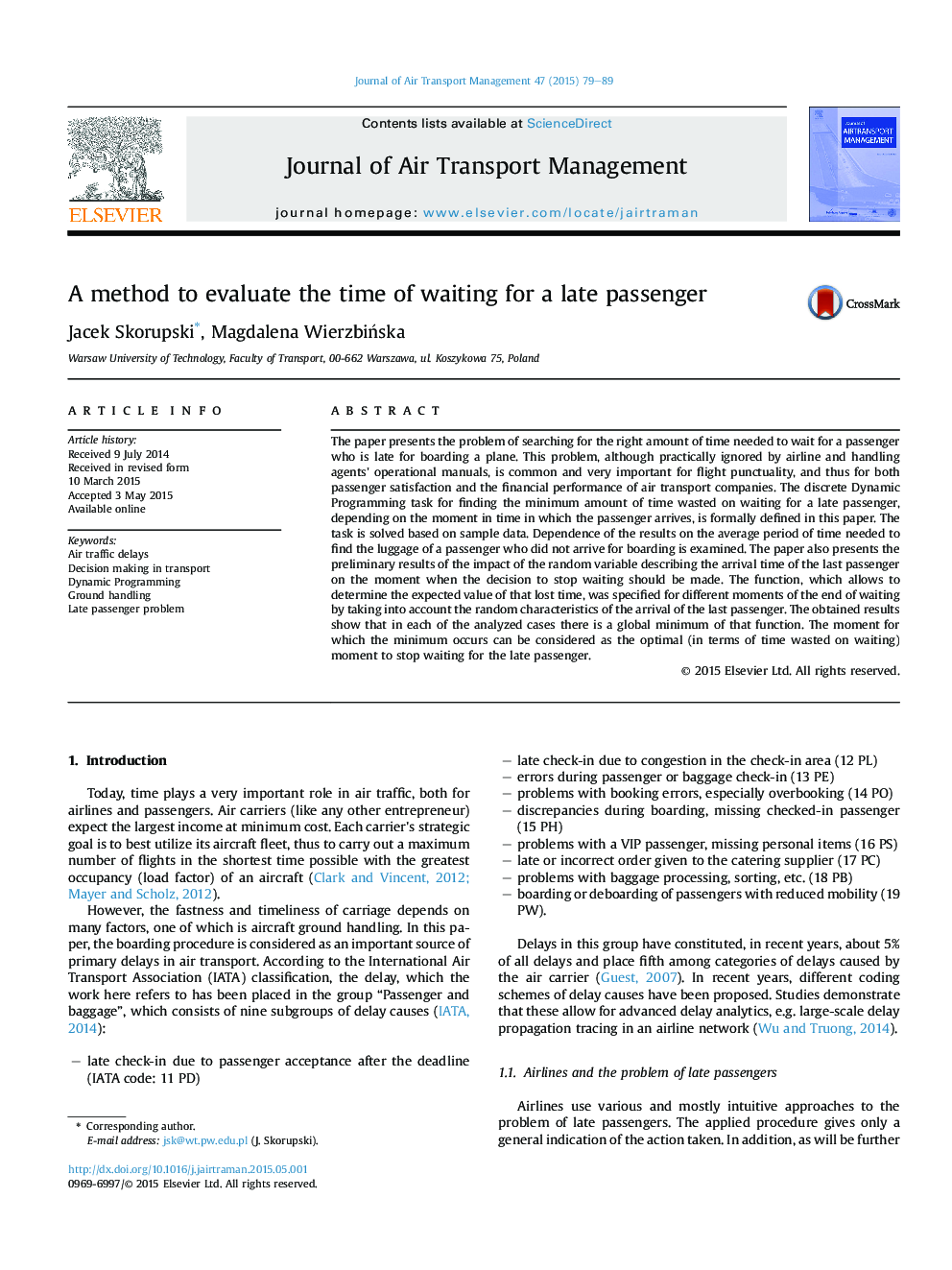| کد مقاله | کد نشریه | سال انتشار | مقاله انگلیسی | نسخه تمام متن |
|---|---|---|---|---|
| 7435712 | 1483571 | 2015 | 11 صفحه PDF | دانلود رایگان |
عنوان انگلیسی مقاله ISI
A method to evaluate the time of waiting for a late passenger
ترجمه فارسی عنوان
یک روش برای ارزیابی زمان انتظار برای یک مسافر دیر
دانلود مقاله + سفارش ترجمه
دانلود مقاله ISI انگلیسی
رایگان برای ایرانیان
کلمات کلیدی
تاخیر ترافیک هوایی، تصمیم گیری در حمل و نقل، برنامه نویسی پویا علامت دادن به هواپیما جهت فرود آمدن، مشکل مسافرتی کم است
ترجمه چکیده
این مقاله مشکل یافتن مقدار مناسب زمان مورد نیاز برای صبر کردن یک مسافر را که برای مسافرت هواپیما دیر می کند، ارائه می دهد. این مشکل، گرچه عمدتا توسط خطوط هوایی و دستورالعمل های عملیاتی عاملان نادیده گرفته شده است، برای لحظات پرواز و به این ترتیب برای رضایت مسافران و عملکرد مالی شرکت های حمل و نقل هوایی رایج و بسیار مهم است. وظیفه برنامه ریزی دیجیتال گسسته برای یافتن حداقل زمان صرف زمان انتظار مسافر دیر، بسته به لحظه ای که مسافر می رسد، به طور رسمی در این مقاله تعریف شده است. این وظیفه بر اساس داده های نمونه حل شده است. وابستگی نتایج به میانگین زمان لازم برای پیدا کردن چمدان یک مسافر که برای ورود به بندر وارد نشده است مورد بررسی قرار می گیرد. این مقاله همچنین نتایج اولیه تاثیر تاثیر متغیر تصادفی را نشان می دهد که زمان رسیدن آخرین مسافر را در لحظه ای که تصمیم گیری برای متوقف کردن انتظار انجام می شود، ارائه می کند. عملکرد، که اجازه می دهد تا تعیین مقدار مورد انتظار از آن زمان از دست رفته، برای لحظات مختلف پایان انتظار با توجه به ویژگی های تصادفی از ورود آخرین مسافر مشخص شد. نتایج به دست آمده نشان می دهد که در هر یک از موارد مورد تجزیه و تحلیل، حداقل یک تابع جهانی وجود دارد. لحظه ای که برای حداقل انجام می شود می تواند به عنوان مطلوب (از لحاظ زمان هدر دادن در انتظار) لحظه ای برای متوقف کردن انتظار برای مسافر دیر در نظر گرفته شود.
موضوعات مرتبط
علوم انسانی و اجتماعی
مدیریت، کسب و کار و حسابداری
استراتژی و مدیریت استراتژیک
چکیده انگلیسی
The paper presents the problem of searching for the right amount of time needed to wait for a passenger who is late for boarding a plane. This problem, although practically ignored by airline and handling agents' operational manuals, is common and very important for flight punctuality, and thus for both passenger satisfaction and the financial performance of air transport companies. The discrete Dynamic Programming task for finding the minimum amount of time wasted on waiting for a late passenger, depending on the moment in time in which the passenger arrives, is formally defined in this paper. The task is solved based on sample data. Dependence of the results on the average period of time needed to find the luggage of a passenger who did not arrive for boarding is examined. The paper also presents the preliminary results of the impact of the random variable describing the arrival time of the last passenger on the moment when the decision to stop waiting should be made. The function, which allows to determine the expected value of that lost time, was specified for different moments of the end of waiting by taking into account the random characteristics of the arrival of the last passenger. The obtained results show that in each of the analyzed cases there is a global minimum of that function. The moment for which the minimum occurs can be considered as the optimal (in terms of time wasted on waiting) moment to stop waiting for the late passenger.
ناشر
Database: Elsevier - ScienceDirect (ساینس دایرکت)
Journal: Journal of Air Transport Management - Volume 47, August 2015, Pages 79-89
Journal: Journal of Air Transport Management - Volume 47, August 2015, Pages 79-89
نویسندگان
Jacek Skorupski, Magdalena WierzbiÅska,
